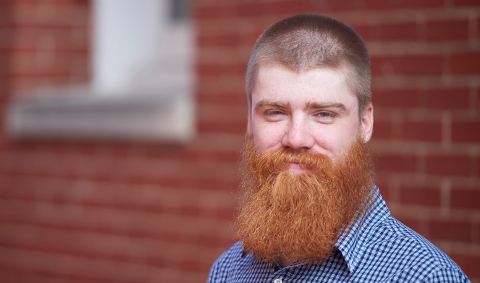
Wes Gilkey
In April Wes Gilkey ’17, ’18M began working as a graduate intern with the Hocking County Sheriff’s Office as a data administrator for the Hocking Overdose Partnership Endeavor, also known as Project HOPE.
The HOPE team consists of experts and community leaders from around Hocking County, including representatives from Jobs and Family Services, TASC of Southeast Ohio, the Sheriff’s Office, EMS, and others.
Every week the team meets and discusses overdoses or substance abuse cases, changes in laws or courts, types of treatment plans, opportunities for detox and rehabilitation, etc. After the meeting a small group from the team meets with referred people in the community who have suffered from an overdoses or substance abuse to offer them resources and assistance with overcoming their addiction.
Gilkey started in the Sociology master’s program after graduating with his B.A. in Sociology-Criminology and in Russian, with a Certificate in Russian Studies from the College of Arts & Sciences at Ohio University.
From Internship to Part-Time
What started as an opportunity for an internship resulted in a part-time job over the summer. Gilkey collected information on referral visits, such as if the person was successfully contacted, demographic information, and if they were given resources packets or Narcan, among other things.
He was able to show that the efforts of the HOPE team have not only been successful in staying in contact with individuals who are at risk, but also have been very successful in helping people obtain access to detox and rehabilitation services that they may not have otherwise accessed.
Project Coordinator and Researcher
Gilkey is now a project coordinator and researcher in Hocking County overseeing the entire county’s drug use statistics. Through a grant from the Bureau of Justice Assistance, he analyzes data from Project HOPE and other service providers from around the county to study both county-wide drug abuse and how Project HOPE is making a difference. He also attends drug court sessions in Hocking County to better understand how their programs are making a difference at the grassroots level.
Making a Difference
“I love being a part of Project HOPE because we are making a real difference at a local level,” Gilkey says. “We have the data to prove that meeting with people and showing them that you care can have a meaningful impact on their lives. Many people are isolated or do not think that people care about them, and we show them that they have resources and chances to get help with substance abuse disorder. It’s very rewarding to know that you’re a part of a group that has saved multiple people from overdose.”
What surprised him most about working with Project HOPE is that he always assumed that he would work in law enforcement as a peace officer, not as someone who collects data and publishes reports to the government.
However, his classes in grad school and work so far this year have made him realize how enjoyable other parts of law enforcement and community outreach can be.
Crunching numbers, coordinating visits, and publishing reports to prove that what he and his colleagues are doing is worthwhile and can be just as important as meeting with people personally in the field.
After working with HOPE, Gilkey feels confident about continuing in a career that involves curbing drug addiction in Appalachia. “There are always ways that we can be better at developing our communities,” he says, “and I hope that I can be a valuable asset in doing so in the years to come.”



















Comments